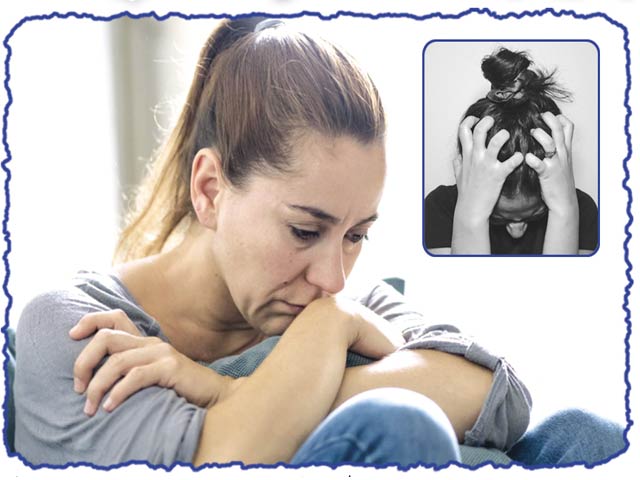Recently, a report by the International Organization for Women came into view, in which it was revealed that according to a survey conducted at the global level, depression, stress, anger, mental disorders are more common among women than men in the last 10 years. Stress, anxiety and depression have increased significantly.
Feeling depressed is a normal response to difficult times in life, but usually, depression goes away over time. Depression is different.
It is a mood ‘disorder’, which can cause severe symptoms, which can affect how you feel, think and manage or carry out everyday activities, such as sleeping, Eating, or working. Depression is more common in women than men, possibly due to certain biological, hormonal, and social factors that are unique to women.
Dealing with sadness or depression requires first acknowledging that you actually have the problem, as depression is a real medical condition.
Depression is a common but serious mood disorder. Symptoms of depression can interfere with your ability to work, sleep, study, eat and enjoy your life.
Although research into the causes of depression has always been an important part of the discipline of psychology, current research suggests that depression is caused by a combination of genetic, biological, environmental, and psychological factors. Most people with depression need treatment to feel better.
It’s also important to understand that you can’t just ‘snap out’ of depression. Good friends or family members may try to tell someone with depression to ‘get over it’, ‘just stay positive’ or ‘if you try harder, you can be happier.’ But depression is not a sign of a person’s weakness or character disorder. The truth is that most people who suffer from depression need treatment in order to get better or the consequences can certainly be tragic.
If you are a friend or family member of a woman suffering from depression, you can offer emotional support, understanding, patience and encouragement. But never reject the feelings of such women. Encourage women with depression to talk to their health care provider, and remind her that, with time and treatment, she can feel better.
Sadness is only a small part of depression. Some people with depression don’t feel sad at all. Women with depression also experience many physical symptoms, such as pain, headaches or digestive problems. Women with depression may also have trouble getting enough sleep, waking up in the morning, and feeling tired.
Women can definitely suffer from depression if certain symptoms are experienced continuously for two weeks. such as persistently sad, anxious, or ’empty’ moods, feelings of hopelessness or despair, irritability, guilt, disgust, or helplessness, loss of energy or fatigue, difficulty sleeping, early morning awakenings Having, or sleeping more, lack of interest or pleasure in hobbies and activities, moving or talking more slowly, feeling restless or having trouble sitting still, difficulty concentrating, remembering, or making decisions. Experiencing, having changes in appetite or weight, thoughts of death or suicide, or making suicide attempts, aches or pains without an obvious physical cause, headaches, cramps, or digestive problems, which are not under treatment. In fact, all these symptoms point to depression in women.
These symptoms need to be discussed openly with your physician. In such a situation, women need to be honest, clear and concise. The therapist needs to know how you feel.
Some types of depression are unique to women. Pregnancy, postpartum depression, perimenopause, and women’s periods are all associated with physical and hormonal changes. Certain types of depression can occur at different stages of a woman’s life.
Premenstrual syndrome, or PMS, refers to moodiness and irritability in the weeks before menstruation. This is quite common, and symptoms are usually mild. But there is a less common, more severe form of PMS called premenstrual dysphoric disorder (PMDD). PMDD is a serious condition characterized by disabling symptoms such as irritability, anger, depressed mood, sadness, suicidal thoughts, changes in appetite, bloating, breast tenderness, and joint or muscle pain.
Pregnant women commonly suffer from morning sickness, weight gain, and mood swings. Taking care of a newborn baby is also a difficult task. Many new mothers experience the ‘baby blues’. A term used to describe mild mood swings and feelings of anxiety, unhappiness and exhaustion, often experienced by women in the first two weeks after childbirth. These feelings usually last a week or two.
Perinatal depression is a mood disorder found in women, which can affect women during pregnancy and after childbirth, and is more serious than the ‘baby blues’. The word ‘perinatal’ refers to the time before and after the birth of a child.
Perinatal depression includes depression that begins during pregnancy and depression that begins after childbirth (called postpartum depression). Mothers with postpartum depression experience feelings of extreme sadness, anxiety and fatigue that can make it difficult for them to carry out everyday tasks, including caring for themselves, their new baby or others.
It seems that every woman born into this world must go through some form of sadness or depression. Every woman who is not visibly depressed experiences some form of depression. Some women may experience only a few symptoms, but the majority of women must suffer from them often. The severity and number of symptoms, and how long they last, will vary depending on the individual and the severity of the disease.
(function(d, s, id){
var js, fjs = d.getElementsByTagName(s)[0];
if (d.getElementById(id)) {return;}
js = d.createElement(s); js.id = id;
js.src = “//connect.facebook.net/en_US/sdk.js#xfbml=1&version=v2.3&appId=770767426360150”;
fjs.parentNode.insertBefore(js, fjs);
}(document, ‘script’, ‘facebook-jssdk’));
(function(d, s, id) {
var js, fjs = d.getElementsByTagName(s)[0];
if (d.getElementById(id)) return;
js = d.createElement(s); js.id = id;
js.src = “//connect.facebook.net/en_GB/sdk.js#xfbml=1&version=v2.7”;
fjs.parentNode.insertBefore(js, fjs);
}(document, ‘script’, ‘facebook-jssdk’));


